Ten Years On – In Memory Of Nick Thierry, Father Of World Swim Rankings
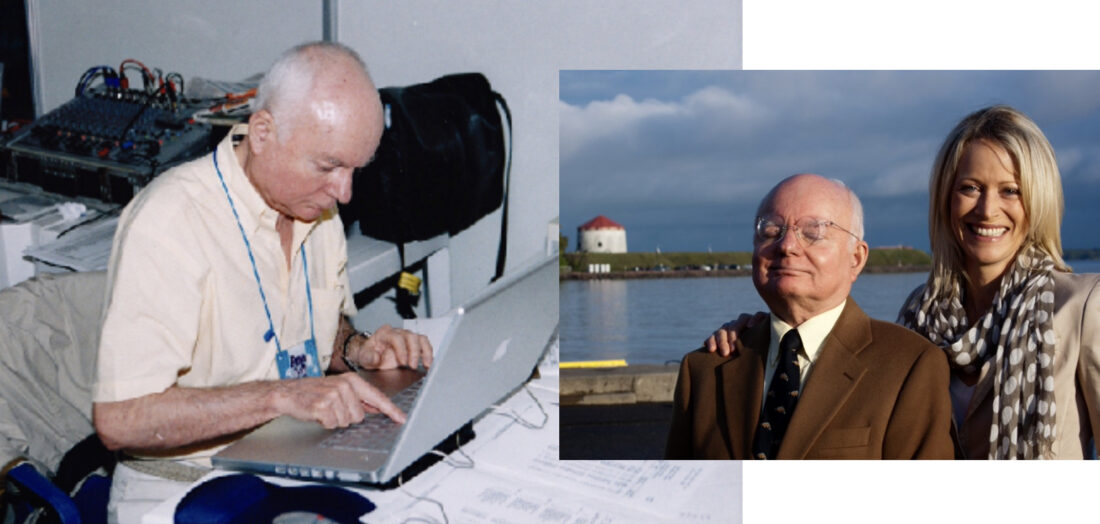
On this day, as each October 2 each year since his passing in 2012, we remember Nick Thierry. Today marks the tenth anniversary of his death. The Father of World Rankings and publisher of Swim Magazine, later SwimNews, has been much missed since Nick left us a few weeks after the London 2012 Olympic Games.
SwimVortex picked up the baton with constant dedication to world rankings and independent journalism that placed emphasis on truth and transparency. The rankings work feeds yet a unique record of the sport of swimming, these days a private resource after SwimVortex closed in 2018, occasionally drawn upon for knowledge and complete with a Horcrux here and a Horcrux there, allowing us to see who lifts the information without permission and places it in their own records.
This site, SOS, is currently taking a sabbatical from constant coverage at a time of focus on other, longer-term work. We live in an era when swim rankings and statistics are presented far and wide, though all too often with errors and a lack of context to explain why any of it matters. Such is life in the digital age. All eyes on the surface, too little consideration of the depth without which the surface would not be there.
Each year we remember Nick is a moment to recall the importance of his life work but also to remind ourselves of what has been and continues to be lost.
Below is the obituary written at the time of Nick’s passing, and a tribute from Karin Helmstaed, colleague, fellow journalist, friend and forever-treasured-friend of a man much missed, along with his immense contribution to swimming.
More than Nick’s daily devotion for so many years, we miss the man, his sharp mind, his clarity, his weddedness to truth and transparency, to holding those in positions of authority over athletes and others to account (he would have loved this fine news on Athlete Safety in the United States), and his friendship – not to mention his voice down the line on a regular basis.
His memory and guiding hand are with us always. RIP Nick.
From the 2012 archive – by Craig Lord and Karin Hemlstaedt
Obituary penned at the time of Nick’s passing
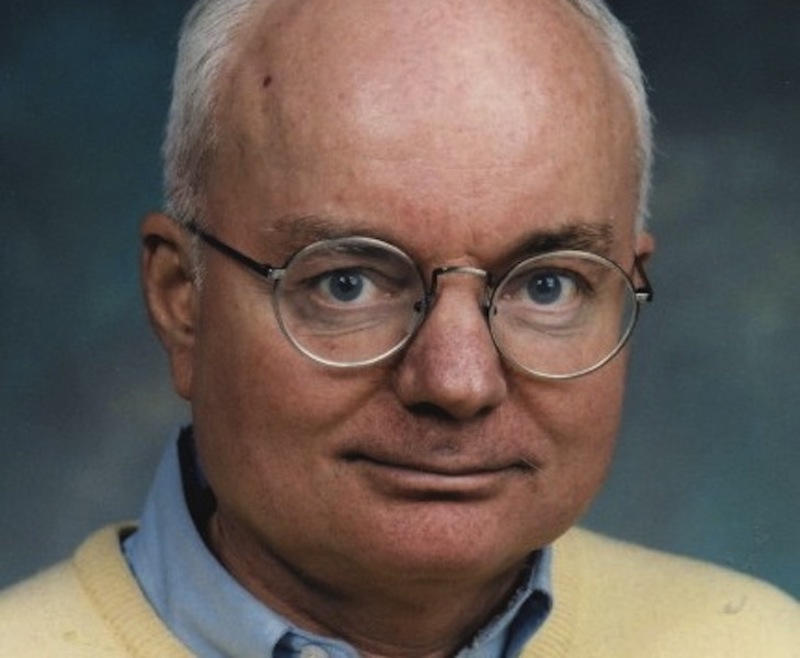
It’s with great sadness and heartache that we have come to terms with the end of an era after Nick Thierry, the founder and publisher of SwimNews, passed away on October 2, 2012, in Toronto.
As the global guru of swimming statistics, Nick kept the record of the sport alive for four decades. His guardianship has been treasured by swimmers, coaches, parents, sport scientists, journalists, sport institutions and swimming federations since he first started to register and chronicle all meets that produced performances worthy of a top 300 placing across all events for men and women – every year for more than 30 years.
Born in Hungary on December 2, 1938, Nick Thierry spent the first eight years of his life in Budapest. In 1948 his family moved to Havana, Cuba, where his father had been transferred while working for the international sleeping car company Wagon-Lits. Nick swam competitively for three years while in Havana and another three years in Toronto, Canada, while studying at the University of Toronto. He obtained a degree in architecture in 1964 and for the next four years worked in an architect’s office – an experience that was partly responsible for Nick’s overriding philosophy in life: keep it simple.
Beyond the subject he studied at school, Nick Thierry had a life-long affair with swimming. In 1961, at U of T, he served as assistant coach and for the next 21 years, he coached at Toronto and surrounding teams, placing swimmers on Canadian Olympic teams in 1964, 1968 and 1972. He was Canadian head coach of two international tours as well as for the 1970 Commonwealth Games team which competed in Edinburgh, Scotland.
Among his charges was the late Angela Coughlan, Commonwealth 100m freestyle champion at those 1970 Games. Two years earlier, she took bronze on the 4x100m freestyle relay at the 1968 Olympics in Mexico City. Nick’s other swimmers included Jim Shaw (5th 100m backstroke, 1968 Olympics), Karen Le Gresley (1972 Olympic Team), Gaye Stratten (1964 National Champion 100m & 200m backstroke) and Judy Garay (Canadian National Champion100m breaststroke in 1977).
In the late 1960s, Nick befriended fellow countryman and coach Stefan Hunyadfi (when Hunyadfi coached in Ft. Wayne, Indiana) and learned a great deal from him, especially in breaststroke. Hunyadfi coached 1968 Olympic breaststroke champion Sharon Wichman (USA).
Perhaps the biggest influence on Nick as a coach was from Hall of Famer Howard Firby (CAN). Even though they coached rival teams, they traveled together to many competitions and even drove to Mexico City for the 1968 Olympics. Coach Peter Daland (USA) also had an impact on Nick, particularly with his research on world rankings from the 1920s and 30s.
From 1961 to 1985, Nick Thierry served in administrative capacities on Swim Ontario’s Board of Directors, the Canadian Swimming Coaches Association (chairman, secretary) and the Swim Canada National Board of Directors.
It was while coaching that Nick first saw the need to keep swimming statistics. Upon his induction into the International Swimming Hall of Fame in 2001, Nick said:
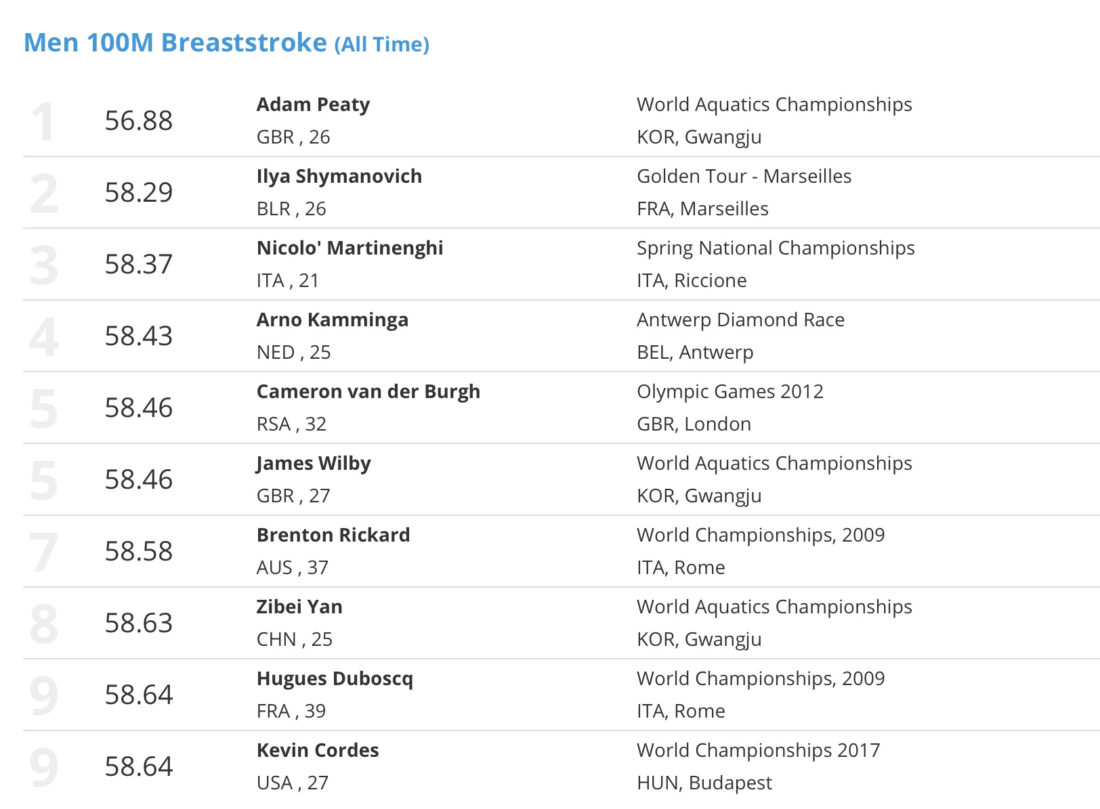
““It was a very effective training tool for my swimmers. The need to know what was going on worldwide was growing in the sport.”
Nick Thierry
He founded Swim Canada Magazine, which went on to become Canada’s monthly swimming publication. It later morphed into SwimNews, with the magazine taking on an online presence from the mid-1990s in partnership with Marco Chiesa, who went from rookie photographer to business associate.
If the publication attracted thousands of subscribers from around the world, the online site grew from pioneering status to a portal that attracted several million hits during the eights days of swimming at the Olympic Games in London last summer. Since 1974, the magazine has carried domestic Canadian and international swimming news, profiles of athletes and coaches, and expert articles on the technical aspects and innovations in the sport.
Nick was publisher, editor, writer and, above all in later years, guardian to a team of writers in whom he saw promise.
He encouraged them to use their skills in the interests of truthful reporting, and if his encouragement and support in the role of “second father” set sail many a fine media career, then his generosity was second to none: the calls (and sometimes demands) for help with rankings, statistics, biographies and more often came thick and fast – and “Sure, I’ll send it straight through” was the standard reply.
Among masterpieces he penned was the January 1988 article “Never a Wasted Stroke,” announcing the retirement of world record-holder and Olympic champion Alex Baumann. He also wrote an excellent feature article entitled “Victor Davis on Breaststroke”; it was published in 1989, just four months before Victor’s tragic death.
It was Nick’s quest to locate and print every available meet and race time that led to the formation of the International Swimming Statisticians Association (ISSA) in 1986 at the FINA World Championships held in Madrid, Spain. Beginning in 1992, statistics in SwimNews were supplemented by printing monthly FINA world rankings and yearly short and long course FINA annuals. Originally, record keeping was done manually with Nick personally hand-typing each line of statistics. With the introduction of the fax machine, records and dates could instantly be transmitted and received for publication. He then developed specialized PC and computer software programs, such that data could be instantly transmitted, ranked and printed on demand.
In 2007, Nick began to invest in the development of a rankings database that now contains his 40 years of swimming rankings and statistics as well as all major international results from swimming dating back to the Athens 1896 Olympic Games. That immense work is part of his legacy.
In the last year of Nick’s life, FINA informed him that swimming’s international federation no longer wished to publish the rankings annuals because it would be working with USA Swimming instead. The move was both painful and stressful for Nick Thierry after a lifetime of dedication. Beyond that, a tradition, a thread of history was severed. Today, the biggest archive of world swimming progression and a unique resource and measure of its history is in private hands, though living, maintained and updated yet.
The news that Nick Thierry would no longer be producing the statistics that were so useful and loved by journalists who had instant expertise at their fingertips just when they needed it was met with concern by those who relied on accurate, up-to-the-minute rankings to report on the sport at live events.
The loss of the “Thierry Start Lists” with deep data, including textile and non-textile comparisons, alongside biographical details of swimmers, their coaches, rankings, results and record progressions – dealt a serious blow to swimming coverage, with the quality of information distributed to the press at major events in the past two Olympic cycles at its weakest in more than 25 years.
The swimming community owes Nick Thierry a huge debt of gratitude. His Hall of Fame citation included the following:
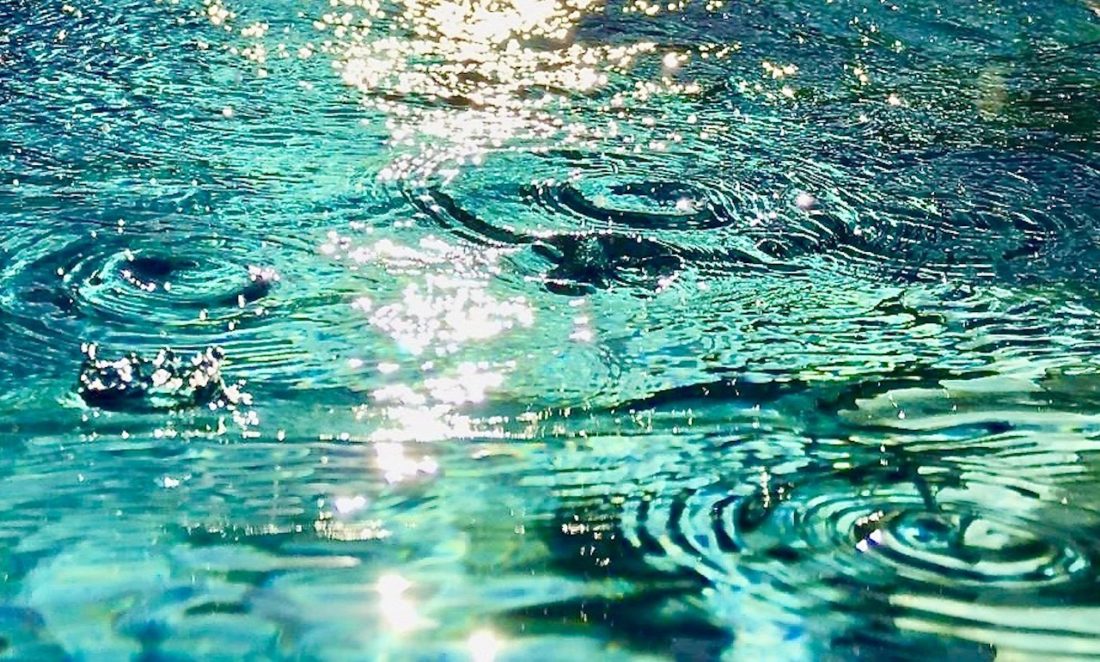
“Sorting through the seemingly endless volumes of numbers and times, Nick makes order out of chaos and assures every swimmer that his or her time will be accurately placed in the pecking order of performances. Nick’s no-nonsense approach to his work, his coolness under pressure and his unique style and perseverance, in a very unassuming way, have contributed to his success as publisher/editor of SwimNews and as swimming’s top record keeper.”
HoF citation. Photo – Endless ripples – by Craig Lord
Nick was inducted into the International Swimming Hall of Fame in 2001 as an Honor Contributor for his service to the sport.
Beginning back in 1958 as a writer for Bob Kiphuth’s newly formed Swimming World magazine and then for Al Schoenfield when Al became editor and publisher of Swimming World, Nick saw the need for good communication. He has never wavered in that mission and beyond receiving the Al Shoenfield Media Award from ISHOF, he was honoured by various Canadian authorities, the American Swimming Coaches Association and the equivalent world body WSCA.
Nick loved truth, simplicity, a no-nonsense approach to all things, and keeping accurate records that keep the history book of swimming straight. He was wedded to truth, transparency and calling those in positions of governance to account. He held the view that swimming was heading towards becoming a sport void of truly independent journalism. That, he believed, would make the sport smaller and less competitive in the battle for audience and global attention.
Nick loved the classics in literature and music, his collection of classical composers fit to challenge the volume of his swimming archives. A fine chef and a lover of good food, he often shared those interests with friends and was a goldmine of knowledge in the kitchen and the concert hall as well as the pool.
If his work on rankings, records, results and biographies will be sorely missed, it is for a man of many more talents that those closest to him mourn.
Nick Thierry, we miss you greatly – and always will. No words can suitably express what you have done for the sport of swimming. Your contribution has been immense – and your shoes will be hard to fill.
Homage to Nick Thierry – Swimming’s Great Altruist
Karin Helmstaedt remembers a good friend and the best boss any young writer could ever wish for.
“Jeden Tag ein neuer Skandal!” When I think of Nick I can still hear him uttering those words, in theatrical base tones with wide eyes and a devilish grin: every day a new scandal.
That was what his journalist’s heart went after. Whether it was decade-long state-sponsored doping in our sport, coaching mismanagement at the expense of swimmer performance, or developments in swimsuit technology that amounted to premium priced performance-enhancement – those were the kinds of stories he was only too happy to hash out in the pages of SwimNews magazine.
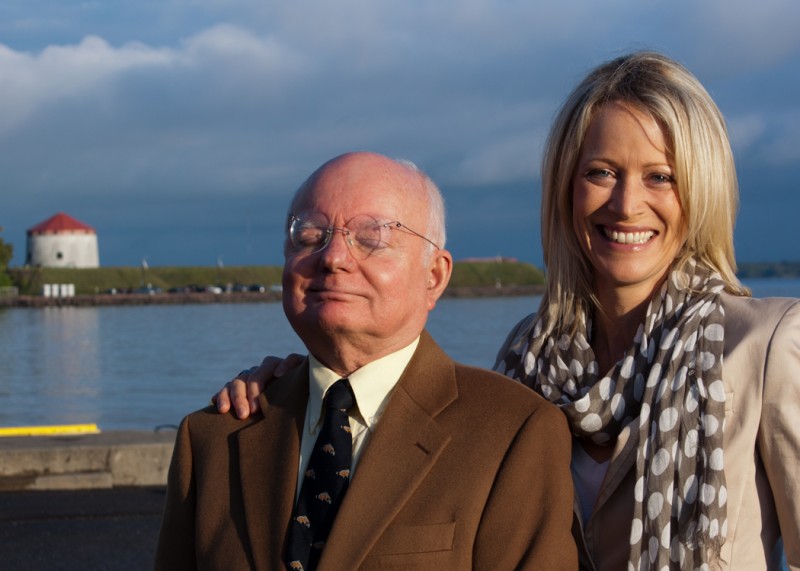
He always had the athletes’ best interests at heart, and funnily enough, not everyone liked him for it – especially some in the swimming establishment. The guy who was always ready to point out the hitch or the hindrance or the real motivation behind bureaucratic ballast was not always a comfy guy to have around, which is why eventually he retreated to the haven of his Cabbagetown home and mostly let his writers do the talking.
The scary thing was: he always knew what he was talking about, having learned what it takes to coach a swimmer to the pinnacle of his or her potential. He could look at a training plan or a competition schedule and predict the problem – and once, after a Canadian subscription was cancelled in a huff over something that had appeared in his pages, his only comment was, “I guess the truth hurts.”
We often spoke in several languages at a time – peppering our conversations with snippets of German, French and Spanish, and the few Hungarian words that I had managed to learn. We made a good team on the international pool deck and were fast friends beyond it for nearly two decades.
There were many things people didn’t know about Nick – whose ultra-laconic mode of expression on the phone or in many professional situations was often unsettling for those meeting him for the first time. Like his soft spot for cats (he had food at his back entrance for a local stray at the time of his death), his boyish enthusiasm for Belgian comics and model trains, or his recurring urges to paint and experiment with colour and lines. He would often repeat a simple combination over and over again until he got just the effect he wanted. When he did – just the right transition of blue to green to yellow – he was elated.
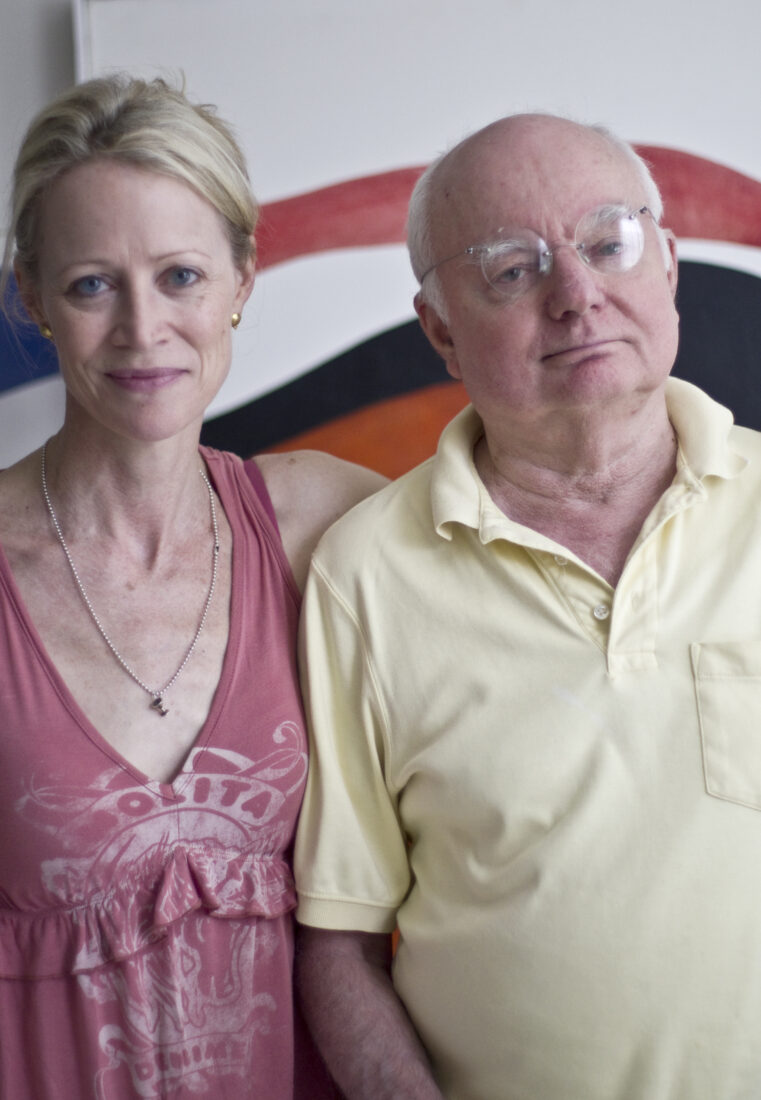
That sensitivity carried over into his quirky and wonderful ways of caring. When I was pregnant with my first child I traveled from Africa to Argentina to Atlanta in service of SwimNews as we strove too add more international scope to the magazine – and when I touched down in Toronto he cooked me lentils to make sure I was getting the prescribed pre-natal amounts of folic acid. “Go sit down and put your feet up!” he’d order after a long day at the pool – or when the nutritional value of the available media slop failed to meet his standards he sent me packing to the hotel to “get a proper meal!” How many bosses do you know who care that much?
Food was also one of Nick’s major modes of expression and the other place I will remember him most is in the kitchen – handing me a “cafecito” from his professional espresso machine, or expounding at length on the merits of construction of a Swiss cooking pot. He introduced me to saffron, to homemade Swedish gravad lax, and taught me to make Spanish paiella and Hungarian veal paprikash. He had a trick with vinegar for poaching the perfect egg. Food was a trigger for memories, and he reminisced often about a sublimely grilled sea bass he ate in Trieste with his father, or a sumptuous piece of Sacher Torte in Vienna.
Nick’s admiration for his parents, his older brother George and for many of his former athletes was endless – and for that unwavering constancy and quality of judgement, people who got to know him admired him back. One of the things that struck me most upon meeting so many of his former swimmers at his funeral, was the unquestioning trust they placed in him and – especially the women – their acknowledgement of the respect he showed them as young athletes. Not every coach can claim such a thing.
But for Nick, it wasn’t a star in his crown, but just a normal way to treat people.
It was two moons after Michael Phelps’ superhuman exploits at the London Aquatic Centre that we lost him – and a half dozen moons later I still can’t believe he is gone.
Within that time the first requests for “help” with swimming world rankings began trickling in. Short emails in which the enquirers remarked rather embarrassed that of course, other rankings could be found on the FINA website, but that Nick’s were “compressed” and somehow much easier to use.
No kidding – because he had honed and perfected them for years and years – a service that was appreciated by many but also, in retrospect, taken for granted by so many more. There’s a bittersweet twinge to the fact that Nick’s work was even snubbed by our sport’s international governing body when his open and honest way of doing things was perceived as a threat. There’s no better proof that such an organization hardly has the sport’s best interests at heart – when it should not only have seen the value, but could feasibly even have seen to its continuum. In the interest of the swimmers? That obviously seemed like a bizarrely naïve concept in the VIP lounge…but it was that “naïve” dedication that separated Nick from the brigades of egos in suits.
Swimming has lost its greatest altruist – and Canadian swimming its greatest chronicler.
Nick had been around so long that some people said they had thought he was “immortal.” Sadly, like all of us, he wasn’t.
When my son was born 17 years ago – Nick’s first reaction was to send me a copy – by fax – of E.E.Cummings’ poem “I thank you God for this most amazing day.”
He had no qualms, in times of great wonder and emotion, to let the poet do the talking. I’ve had to do the same when it comes to expressing what he meant to me – and I return to those poems frequently these days just to find him there.
In a final act of largesse, Nick donated his eyes after his death. So I know that from somewhere he’s still watching over the foibles of the world – understanding at last the final line of another beloved Cummings’ poem:
(now the ears of my ears are awake and
now the eyes of my eyes are opened).